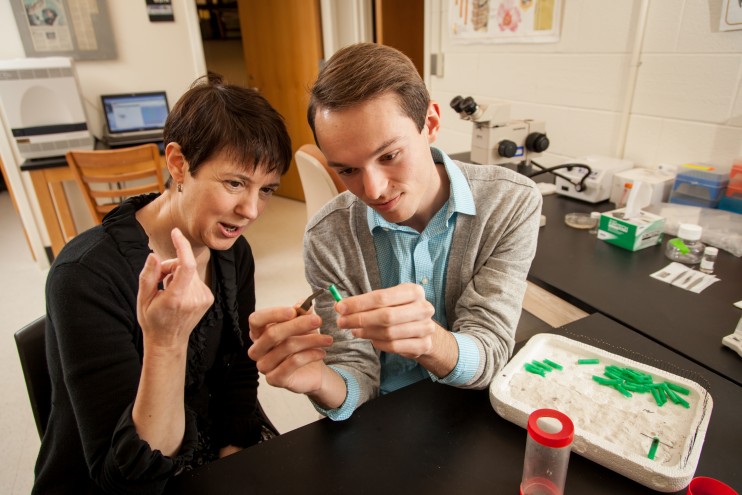
Susan Fahrbach, Ph.D. is the Reynolds Chair of Biology at Wake Forest University. Created in 1982, Reynolds Professorships represent Wake Forest University's most prestigious professorship. The gift was given to help Wake Forest attract and retain faculty who demonstrate the highest academic values, exhibit a genuine commitment to the teacher-scholar model, and contribute to an exciting learning environment through superb classroom teaching and progressive research programs. Currently nine faculty hold these positions. Dr. Maya Angelou was a Reynolds Professor.
We recently sat down with Dr. Fahrbach to learn more about her work as well as her thoughts on the importance of mentorship in the sciences and building strong alumni ties with the school.
1. Your research examines learning behaviors and brain plasticity, exemplified by adult honeybees. Tell us more about your work.
I'm interested in finding the parts of the brain that allow an animal to learn new things, along with the nerve cells, connections and molecules that regulate the connections.
Honeybees go out from their hive, they have to find where the flowers are so they can bring back pollen and nectar. Honeybees do that throughout most of their adult lives. It’s the perfect animal model for studying learning.
It all happened because of a graduate student! In 1990 Ginger Withers was a neuroscience doctoral student in my lab at the University of Illinois. One of our colleagues, Bill Greenough, had conducted pioneering studies on how experience changes the detailed structure of the brain in rats. Ginger was working on different project at the time, but after a seminar one day wondered if the same phenomenon could be studied in honey bees. Together with my colleague Gene Robinson, we designed the first experiment that showed us the answer was yes! Ginger was first author on a paper published in the journal Nature describing our results in 1993. That was a long time ago – Ginger is now a professor and Chair of Biology at Whitman College in Walla Walla, Washington. We are both still studying the same intriguing phenomenon of neuronal plasticity.
2. What are the broader impacts of your research with honeybees?
It's important because all animals, humans included, can learn new things throughout the entire length of their lives. We also know there are some humans who don't learn very well. Those are folks with intellectual disabilities or genetic disorders like Downs Syndrome. And at the molecular level, all animals are the same.
3. You are a successful researcher but you also teach at a smaller liberal arts university. What is the most rewarding aspect of working in a small department at a smaller-sized school?
To me, it's just as important to teach introductory biology to freshman and sophomores as it is to work in the lab. I may have been teaching this class since I came here in 1988, but for each student – it could be their first time and only time they take that entry level course – I get psyched up.
Students take classes because they have goals. Even if the student can't articulate his or her goal, everyone is here for a reason. It’s very motivating – in a class of 40 students, that’s 40 different goals. Teaching is a profession and it’s a little bit like a calling.
4. What do you think about the role of mentorship in the sciences?
It's really important to me to find ways for students to come in the lab and be mentored by me or work with graduate students. A lab is like a little family.
[Mentorship] is just more concrete [than in other areas] because we still by and large follow an apprenticeship model. If you need to use a microscope or get the brain out of the head of a bee, the way you learn to do that is I sit down beside you and guide you. It’s hands-on, hang-out-in-the-lab time.
I was a graduate student at a high-powered research-only place, where there are no undergraduate students. There is no teaching mission, it’s all research. That's a different type of environment, and I didn't care for it as much. I liked the resources but I never had a vision of just leading a big research team.
5. You were named chair of the Biology department in summer 2014. What do you hope to achieve in this position?
It’s an opportunity to not focus so much on my own lab, but to be a good steward of the department, so we can not only be good today and next week, but be good longer term.
When I interviewed for my current position, the faculty was very frank in that even if they could hire an eminent researcher, that wouldn’t be as valuable to them as someone who was open and interactive with students. That’s what I do.
We're hoping to become more active on social media. That would be a natural way to keep in touch with our alumni. We had a pretty static department website, so one thing I've done is put a chair's blog on it, update the homepage. I've worked with a senior undergraduate to develop an undergraduate blog. Just the little things that take some creativity and time but don't cost anything. Now our hope is that our current majors will come to the website more often, and when they leave they'll interact with us.